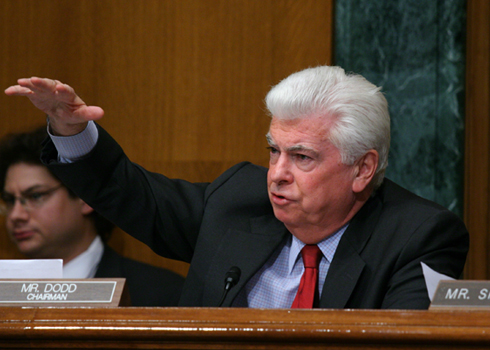As we’ve reported, the pay-day lending industry — one of the most predatory players corners in the modern financial system — has recently been hard at work lobbying to water down provisions in the financial regulatory reform bill currently in the Senate. (We also told you about the industry’s key lobbyist, who used to be the sub-prime industry’s man in Washington.)
Now Sen. Chris Dodd (D-CT) has unveiled the reform proposal that will create the basis for the Senate bill. And it looks like the industry’s lobbying, up to a point, has paid off — although it’s still unhappy that it’s being seriously regulated at all.
The new consumer agency to be created by the bill will have the authority to enforce regulations for large pay-day lenders, according to a summary of the bill prepared by the Senate Banking committee. A spokeswoman for the committee did not go beyond that characterization in a response to TPMmuckraker.
But what counts as large? There’s the rub.
In order to define a pay-day lender as large, and therefore subject to enforcement, the new agency would have to conduct a rule-making process, according to consumer advocate Ed Mierzwinski of the U.S. Public Interest Research Group, who has examined Dodd’s proposal. That’s an arduous process that can take six months or more, and would require the agency to “jump through a number of hoops,” Mierzwinski told TPMmuckraker. And even then, he said, the rule can be challenged.
By contrast, the House bill passed in December gives the new agency full authority to write and enforce rules against all payday lenders, Steve Adamske, a spokesman for the House Financial Services committee, told TPMmuckraker. The original proposal from the Treasury Department also did so.
“It’s an additional impediment to the agency’s authority,” said Mierzwinkski of the Senate bill’s approach. “It’s clearly in response to the industry’s pressure.” That pressure appears to been strengthen by Sen. Bob Corker (R-TN), an ally of the industry who reportedly weighed in with Dodd to weaken the pay-day provisions.
“We don’t like it,” Mierzwinski added, stressing that consumer advocates hope the proposal will be tightened as the process proceeds.
Still, the pay-day lending industry isn’t jumping for joy either. It argues that it’s unfair to make any pay-day lenders, large or small, subject to the same regulatory agency as the Wall Street banks that directly caused the financial crisis. “We think lumping an industry that makes $350 loans on average with hedge funds and ‘too-big-to-fail’ banks is a little overreaching,” said Steve Schlein of Dezenhall Resources, a Washington PR firm representing the pay-day lenders’ industry lobby group — with a healthy dose of sarcasm on that “little.”
Consumer groups and their allies in Congress and the Obama administration counter that the competitive pressure on the banks from less regulated sectors like the pay-day lenders prompted the banks to lower their lending standards, helping to create the mortgage crisis. And they add that the predatory practices of the pay-day lenders — whose loans can carry interest rates of as much as 400 percent on an annualized basis, leading many working-class borrowers to end up digging themselves deeper into debt —
deserve greater regulation in their own right.
But thanks to the industry’s lobbying, it’s far from clear that Dodd’s proposal — leaving aside the final bill that emerges — will do as much as it should to crack down on those practices.









